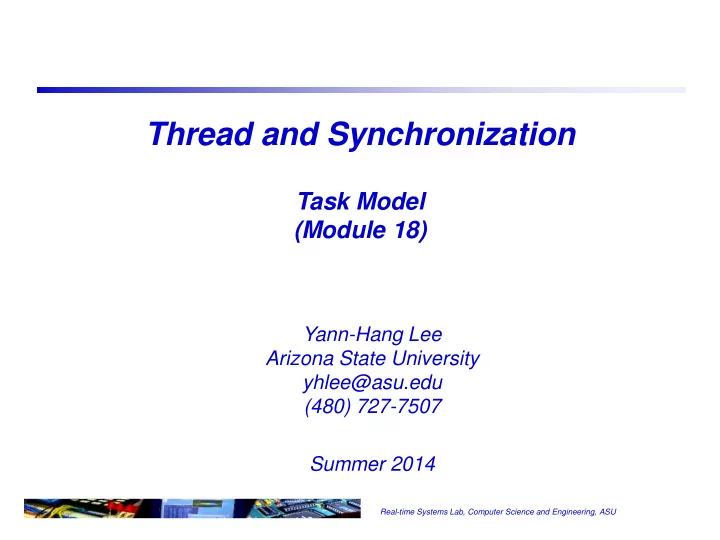

Thread and Synchronization Task Model (Module 18) Yann-Hang Lee Arizona State University yhlee@asu.edu (480) 727-7507 Summer 2014 Real-time Systems Lab, Computer Science and Engineering, ASU
Why Talk About This Subject A thread of program execution How a program start and end its execution waiting for an event or a resource, delay a period, etc. For concurrent operations → multiple threads of program execution How can we make this happen? support for program execution sharing of resources scheduling communication between threads 1 Real-time Systems Lab, Computer Science and Engineering, ASU
Thread and Process Process: an entity to which system resources (CPU time, memory, etc.) are allocated an address space with 1 or more threads executing within that address space, and the required system resources for those threads Thread: a sequence of control within a process and shares the resources in that process Lightweight process (LWP): LWP may share resources: address space, open files, … clone or fork – share or not share address space, file descriptor, etc. In Linux kernel, threads are implemented as standard processes (LWP) that shares certain resources with other processes, and there is no special scheduling semantics or data structures to represent threads 2 Real-time Systems Lab, Computer Science and Engineering, ASU
Why Threads Advantages: the overhead for creating a thread is significantly less than that for creating a process multitasking, i.e., one process serves multiple clients switching between threads requires the OS to do much less work than switching between processes Drawbacks: not as widely available as the process features writing multithreaded programs require more careful thought more difficult to debug than single threaded programs for single processor machines, creating several threads in a program may not necessarily produce an increase in performance (only so many CPU cycles to be had) 3 Real-time Systems Lab, Computer Science and Engineering, ASU
POSIX Thread (pthread) IEEE's POSIX Threads Model: programming models for threads in a UNIX platform pthreads are included in the international standards pthreads programming model: creation of threads managing thread execution managing the shared resources of the process main thread: initial thread created when main() is invoked has the ability to create daughter threads if the main thread returns, the process terminates even if there are running threads in that process to explicitly avoid terminating the entire process, use pthread_exit() 4 Real-time Systems Lab, Computer Science and Engineering, ASU
Linux task_struct struct task_struct { /* Linux/include/linux/sched.h */ volatile long state; /* -1 unrunnable, 0 runnable, >0 stopped */ void *stack; atomic_t usage; unsigned int flags; /* per process flags, defined below */ unsigned int ptrace; int lock_depth; /* BKL (big kernel lock) lock depth */ int prio, static_prio, normal_prio; unsigned int rt_priority; const struct sched_class *sched_class; …………….. struct mm_struct *mm, *active_mm; struct thread_struct thread; /* CPU-specific state of this task */ struct fs_struct *fs; /* filesystem information */ struct files_struct *files; /* open file information */ 5 Real-time Systems Lab, Computer Science and Engineering, ASU
Process -- task_struct data structure state: process state TASK_RUNNING: executing TASK_INTERRUPTABLE: suspended (sleeping) TASK_UNINTERRUPTABLE: (no process of signals) TASK_STOPPED (stopped by SIGSTOP) TASK_TRACED (being monitored by other processes such as debuggers) EXIT_ZOMBIE (terminated before waiting for parent) EXIT_DEAD thread_info: low-level information for the process mm: pointers to memory area descriptors tty: tty associated with the process fs: current directory files: pointers to file descriptors signal: signals received …………. 6 Real-time Systems Lab, Computer Science and Engineering, ASU
Linux Processor State /* This is the TSS (task State Segment) defined by the hardware and saved in stack. */ struct x86_hw_tss { unsigned short back_link, __blh; unsigned long sp0; unsigned short ss0, __ss0h; unsigned long sp1; unsigned short ss1, __ss1h; /* ss1 caches MSR_IA32_SYSENTER_CS: */ unsigned long sp2; unsigned short ss2, __ss2h; unsigned long __cr3; unsigned long ip; unsigned long flags; unsigned long ax; unsigned long cx; unsigned long dx; unsigned long bx; /* For ARM, Linux/arch/arm/include/asm/thread_info.h., 7 Real-time Systems Lab, Computer Science and Engineering, ASU
Linux Thread State Transition Wait satisfied Blocked Ready Preempted Start Wait for resource Scheduled Running Done or cancelled Terminated 8 Real-time Systems Lab, Computer Science and Engineering, ASU
Task Management in vxWorks executing Execution pending ready delayed Ready Blocked suspended taskInit() Task structure in task control block – priority(initial and inherited), stack frame, task current state, entry point, processor states (program counter, registers) callback function (hook) pointers for OS events spare variables 9 Real-time Systems Lab, Computer Science and Engineering, ASU
VxWorks Task States typedef struct windTcb /* WIND_TCB - task control block */ { char * name; /* 0x34: pointer to task name */ UINT status; /* 0x3c: status of task */ UINT priority; /* 0x40: task's current priority */ UINT priNormal; /* 0x44: task's normal priority */ UINT priMutexCnt; /* 0x48: nested priority mutex owned */ UINT lockCnt; /* 0x50: preemption lock count */ FUNCPTR entry; /* 0x74: entry point of task */ char * pStackBase;/* 0x78: points to bottom of stack */ char * pStackLimit; /* 0x7c: points to stack limit */ char * pStackEnd; /* 0x80: points to init stack limit */ #if (CPU_FAMILY==I80X86) /* function declarations */ EXC_INFO excInfo; /* 0x118: exception info */ REG_SET regs; /* 0x12c: register set */ DBG_INFO_NEW dbgInfo0; /* 0x154: debug info */ #endif /* CPU_FAMILY==I80X86 */ 10 Real-time Systems Lab, Computer Science and Engineering, ASU
Recommend
More recommend